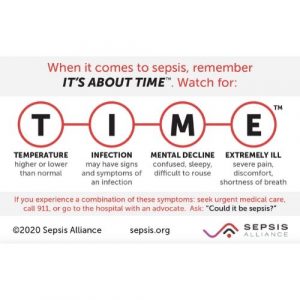COVID-19 Vaccines Update & Should You Get One?
November 30, 2020
There’s been a lot of debate about COVID-19 vaccines in development. And as the possibility of an effective vaccine draws closer, the debates are louder than ever. Which vaccine is better? How will the vaccines be distributed? Should you get a COVID-19 vaccine?
Preventing COVID-19 Means Preventing Viral Sepsis
“We have been following the news about COVID-19 vaccine candidates because they will save many lives. People who contract COVID-19 and become seriously ill develop viral sepsis. And as we know, sepsis can be – and often is – fatal,” Thomas Heymann, CEO and President of Sepsis Alliance said. “Sepsis also can leave survivors with life-long disabilities, like amputations, chronic pain, and cognitive decline.”
Having COVID-19 doesn’t mean you are safe. People who had COVID-19 may get it again. According to the CDC, early evidence suggests natural immunity to COVID-19 may not last very long. So, experts say anyone who can be vaccinated should be.
Although COVID-19 vaccine won’t be an instant fix for the pandemic and the problems it caused around the world, it is the first step to returning back to some form of normalcy. “Sepsis Alliance promotes the use of vaccines to try to prevent the spread of infection. Any type of infection can cause sepsis,” Heymann said. “Now that there may be a vaccine for COVID-19, we urge everyone to get vaccinated unless they have extenuating circumstances that may prevent it.”
Vaccines Close to the Finish Line
There are currently three COVID-19 vaccines close to approval. Pfizer was first out of the gate to request FDA Emergency Use Authorization (EUA) for its vaccine, developed with BioNTech. “[It] is a critical step in making our vaccine candidate available to the global population as quickly as possible,” BioNTech CEO Ugur Sahin, MD, said press release. The companies used data showing a 95% efficacy rate among the 45,000 volunteers.
The second vaccine candidate is from Moderna Inc., which states its vaccine is 94.5% effective in preventing the infection; 30,000 volunteers participate in this trial. “There were 30 cases on placebo and zero cases that were on the vaccine,” Moderna president Stephen Hoge, MD, said in an NPR article earlier today. “So, it looks like in the trial we’ve been 100 percent effective at preventing severe COVID-19, which is really what’s driving the burden of disease in hospitals and ultimately straining our public health systems.” Moderna has also filed for EAU from the FDA.
Storing the vaccines
Both the Pfizer and Moderna vaccines use a mRNA delivery technology – the mRNA tells cells which proteins to make to fight the virus. They are both are given in two separate injections, but where they differ is how they are stored. The Pfizer vaccine must be kept at -70°C (-94°F) for transportation and storage, and then the vaccine can be kept for a week at -8°C (-17.6°F). The ultra-cold storage temperatures could be a problem for remote and underserved populations. According to the press release though, “Pfizer has vast experience and expertise in cold-chain shipping and has an established infrastructure to supply the vaccine worldwide, including distribution hubs that can store vaccine doses for up to six months.”
A Moderna press release states their COVID-19 vaccine candidate “remains stable at 2° to 8°C (36° to 46°F), the temperature of a standard home or medical refrigerator, for 30 days. Stability testing supports this extension from an earlier estimate of 7 days. mRNA-1273 remains stable at -20° C (-4°F) for up to six months, at refrigerated conditions for up to 30 days and at room temperature for up to 12 hours.”
The third vaccine
The third vaccine is different. On November 23rd, AstraZeneca released findings on its vaccine candidate, often called the Oxford vaccine. They also claim a 90% efficacy rate for their two-dose vaccine, which was tested on more than 20,000 volunteers. Unlike Pfizer’s and Moderna’s vaccines, the Oxford vaccine injects a modified virus genetic code that tells the body to recognize the novel coronavirus as dangerous and to fight it off.
It is also different because of its storage requirements. It can be stored in regular refrigerated temperatures.
Don’t Get Ready to Party Yet
As good as this news is, it’s important to understand that vaccines don’t work immediately and the population still has to keep up its infection prevention steps: washing hands, wearing a mask, and staying at least 6 feet away from others not in your immediate bubble.
It can take a few weeks for your body to respond to the vaccine, particularly when it’s a two-dose vaccine. This means you could still become ill if you are exposed to COVID-19 before the vaccine takes effect. This happens every year with the seasonal flu vaccine – and frequently, people incorrectly blame the vaccination for making them ill.
“COVID-19 will not go away on its own,” Heymann added. “We must vaccinate as many people as possible to prevent spread and more harm.”
To learn more about COVID-19 and sepsis, visit the Sepsis Alliance COVID-19 resource page.
If you or a loved one does have COVID-19, watch for signs of worsening, and possible sepsis.






























